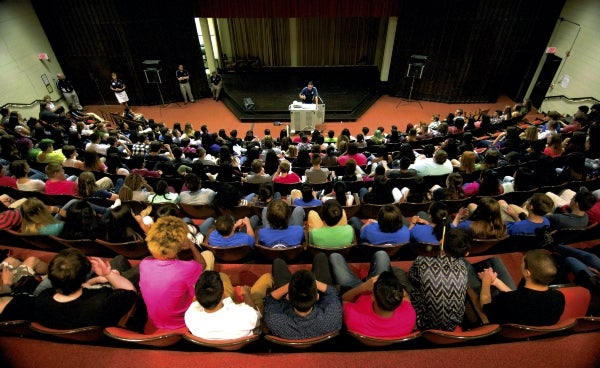Editorial: Vacation vs. education
Published 12:00 am Sunday, August 7, 2016

- Principal Patrick Hosey welcomes Rowan Early College students to school during an assembly at Rowan-Cabarrus Community College on Thursday. JON C. LAKEY / SALISBURY POST
It’s time for North Carolina to refocus the school calendar law.
While state laws about voting and bathrooms make national headlines, the calendar law has quietly compromised North Carolina education for over a decade, tying the hands of school boards that want to set calendars around students’ needs instead of the tourism industry’s desires.
The counter-productive law comes into play each year at this time. Rowan County Early College resumed classes last week, in early August, while traditional schools are forbidden to start until Aug. 29. The consequences ripple throughout the school year.
This all started in 2004, when the General Assembly passed a law mandating that school start no sooner than Aug. 25 and end no later than June 10. The law also put restrictions on teacher workdays in a way that robbed the calendar of all flexibility. Then, in 2012, lawmakers made the problematic law even more restrictive; now school can start no earlier than the Monday closest to Aug. 26 and end no later than the Friday closest to June 11. Getting waivers has become even more difficult.
The Save Our Summers effort to draw summer out as long as possible helps the tourism industry but does nothing for students impacted by the learning loss that can take place over long breaks in education, a loss that impacts at-risk students most. Consequences multiply for high school students who, due to the late start, can’t take first semester exams until after Christmas break. And because their calendars don’t align, high school students have even more difficulty taking college classes, an option they and their parents increasingly want.
Sen. Tom McInnis, R-Richmond, filed a calendar flexibility bill for Anson, Richmond, Rowan, Scotland and Stanly counties in 2015, but he knew it would get no traction. “The hospitality and the hotel and travel industry is one of the most powerful lobbies in North Carolina,” McInnis said at the time. “And if you do something to affect them or what they perceive to be affecting them, the wailing and gnashing of teeth as quoted in the Holy Bible will come out.”
So far lawmakers have not been moved by the fact that Early College and private schools not bound by the calendar law’s dates yield better results. Perhaps they will take note when this year’s Aug. 29 start shortens Christmas break and sets some constituents to wailing and gnashing teeth. Whatever it takes, lawmakers should revisit the school calendar law with better priorities. North Carolina needs to give students a better education, not a longer vacation.


